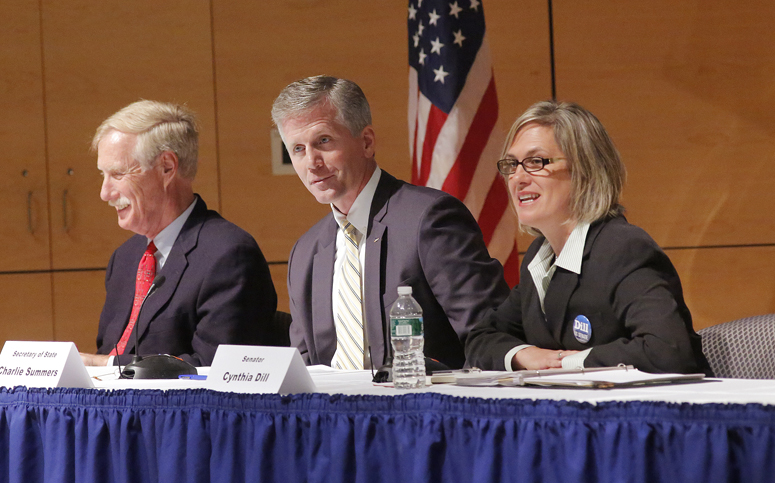PORTLAND — Republican U.S. Senate candidate Charlie Summers said during a debate Thursday that he doesn’t believe humans are the primary cause of climate change.
Summers’ stand on global warming raised one of many disagreements in the debate on energy and the environment, the first public event involving all three top contenders to replace Republican Sen. Olympia Snowe.
About 100 people watched the debate, which was sponsored by the Environmental & Energy Technology Council of Maine and held in Hannaford Hall at the University of Southern Maine.
Moderator Jeff Thaler found the clear point of contention with his first question: “Do you accept the scientific consensus that climate change is happening and is being primarily caused by human activities?”
Summers answered bluntly, “No, I don’t.”
While humans are having an effect on the environment, Summers said, other factors such as volcanic eruptions play a role. “We have to also understand there are natural forces at work here,” he said.
Democrat Cynthia Dill answered next: “The exact opposite of what he said.”
Dill said the evidence is clear and “I am also convinced that it is the biggest threat to civilized society.”
Former Gov. Angus King, an independent, disagreed with Summers, too, and pulled up a graph on his smartphone showing carbon dioxide levels rising in the atmosphere since the Industrial Revolution. “I don’t see how you can possibly avoid the science,” he said.
The disagreement on climate change wasn’t a total surprise.
While Dill and King are vocal supporters of alternative energy as a way to slow climate change, Summers was one of six Republican primary candidates who said in June that they did not believe humans are the primary cause of global warming.
Republican presidential candidate Mitt Romney has expressed similar skepticism, saying recently that “there remains a lack of scientific consensus on the issue — on the extent of the warming, the extent of the human contribution and the severity of the risk — and I believe we must support continued debate and investigation within the scientific community.”
Climate change wasn’t the only issue to separate the candidates Thursday.
Summers said his priority would be to develop domestic sources of energy, including nuclear power and expanded drilling for oil in the United States.
Dill was the only candidate to oppose any Canadian tar sands oil pipelines through the United States and to oppose fracturing bedrock to release natural gas, a process known as fracking.
King generally took a middle road, saying the availability of low-cost natural gas through fracking has presented the country with a historic opportunity to move off oil to alternative energy.
“We need to be looking for energy sources here in the U.S.,” said Summers, who served overseas in the Navy Reserve and said America should stop paying its enemies for oil.
The solution includes domestic drilling because our economy will be based on oil for the foreseeable future, he said.
Summers said he opposes federal subsidies for alternative energies that aren’t cost-competitive. “Our energy sources have to be something that stands on its own two feet,” he said.
Dill said she supports investments in renewable energy and conservation. And she opposes energy production such as nuclear power and natural-gas fracking because of the environmental risks.
“The extraction method used for natural gas is not good,” Dill said. “It’s not something we should move to as Plan B.”
Dill said she also opposes pipelines to carry Canadian tar sands oil through the United States, whether through Maine or through the proposed Keystone XL pipeline out West. The corrosive oil is too risky, she said.
King said he believes that fracking can be done safely and that the technology has helped provide a cheap source of energy.
“Natural gas is America’s second chance,” King said. “It gives us an unparalleled opportunity to get off oil and get off coal.”
Natural gas can be converted to electricity to supply energy to areas without pipelines, he said, although he warned that the country should avoid becoming dependent on gas and keep moving toward renewable energy sources.
King opposes moving tar sands oil through underground pipelines in Maine unless he can be assured that the old, existing pipelines will be safe, he said. But he did not oppose any such pipelines that the Canadians want to build and he would be open to the Keystone XL pipeline.
“If the pipelines are safe and states accept them, it’s OK,” he said.
Staff Writer John Richardson can be contacted at 791-6324 or at:
jrichardson@pressherald.com
Send questions/comments to the editors.



